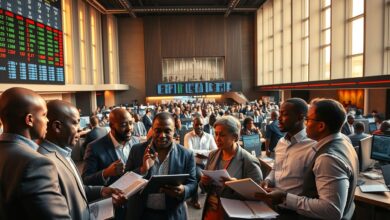Understanding the Forex Market: Beginner’s Guide for South Africans
The Forex Market, also known as the foreign exchange market, is key to the global economy. It offers a wide space for trading currencies. For South Africans, it’s a chance to trade online and grow their investments.
This market never stops working, making it easy for new and seasoned traders to join. This guide will help beginners understand the Forex world. It aims to prepare them for the challenges of trading currencies.
What is the Forex Market?
The Forex Market is the biggest financial market worldwide. It’s where people trade different currencies. It’s open 24/7, six days a week, helping traders from all over.
Every day, over $6 trillion is traded here. This has a big impact on the world’s economies and financial systems.
Definition of Forex
Forex is short for foreign exchange. It’s about changing one currency into another. It’s key for international trade and finance.
People like banks, companies, governments, and individual traders take part. They use economic signs and trends to trade. Knowing what Forex is is important for those interested in it.
Overview of Currency Trading
Currency trading means buying and selling currency pairs. For example, EUR/USD or GBP/JPY. These pairs show how much one currency is worth compared to another.
Traders try to make money from changes in these rates. To succeed, they need to understand the Forex Market well. They use different methods, like technical and fundamental analysis, to guess market moves.
Importance of the Forex Market
The Forex Market is key for global economic transactions. It supports many parts of the world economy. It makes it easy for businesses to trade across borders.
With a stable Forex Market, companies can plan better. This helps them grow and stay competitive.
Economic Significance
The Forex Market does more than just exchange currencies. It affects things like inflation and interest rates. Keeping currencies stable helps investors feel secure.
Without a strong Forex Market, businesses face big challenges. They struggle with managing risks from exchange rates. This can hurt their growth and success.
Impact on Global Trade
The Forex Market greatly affects global trade. It gives the tools for currency transactions. Companies use it to buy and sell goods worldwide.
Changes in currency values can change how competitive products are. This can affect trade volumes and the health of national economies. The Forex Market is crucial for currency stability and global trade.
How the Forex Market Works
The Forex market is a global network where people buy and sell currencies all day, every day. Knowing how it works can help traders succeed. This part will cover currency pairs and the different types of traders involved.
Currency Pairs Explained
Currency pairs are the heart of Forex trading. They show how much one currency is worth compared to another. For instance, EUR/USD shows the euro against the US dollar. Traders try to guess how prices will change, hoping to make money.
The first currency in a pair is called the base currency. The second is the quote currency. Traders want to know if the base currency will go up or down against the quote currency.
Market Participants
Many different traders help make the Forex market work. The main groups are:
- Central Banks: These groups control national currencies and set policies, affecting exchange rates.
- Financial Institutions: Big banks and financial companies do a lot of currency trading. They help clients and make trades for themselves.
- Corporations: Companies use Forex to manage risks from international trade and currency changes.
- Retail Traders: Individual traders use online platforms to trade. They add to the market’s volume.
Knowing who these traders are helps understand how the market works. It’s key to making good trading plans and decisions.
Key Terminology in Forex Trading
Knowing key terms in Forex trading helps traders move through the market smoothly. Learning about pips and spreads is key to making good trading choices.
Common Terminology
The Forex market uses many terms. It’s important for traders to learn these. Here are some common ones:
- Pip: Short for “percentage in point,” it’s the smallest price change in Forex. It’s usually the fourth decimal place in currency pairs.
- Spread: The spread is the difference between the bid and ask prices. It shows the broker’s profit from a trade.
- Lot: Trading in lots means the volume of units traded. It’s key for figuring out trade sizes.
Understanding Pips and Spreads
Knowing pips and spreads helps traders manage their trades better. Pips measure the change in price, important for trade gains or losses. The pip value changes with the currency pair.
Spreads vary with market conditions and broker rules. Understanding spreads is crucial because it affects trading costs. By grasping these Forex terms, traders can make better choices in their trading.
How to Get Started in Forex Trading
Starting in Forex trading requires a solid foundation. This includes choosing the right Forex broker and understanding how to open a trading account. Beginners should look for regulated brokers with flexible fees. Knowing the different online trading platforms can also improve your trading experience.
Choosing a Forex Broker
Finding the right Forex broker is crucial for success. Consider these important factors:
- Regulatory Compliance: Pick brokers regulated by trusted bodies for safety and clearness.
- Fee Structures: Look at spreads, commissions, and other fees to match your trading style.
- Available Platforms: Check the trading platforms offered to ensure they meet your technical and usability needs.
Opening a Trading Account
Opening a trading account is the next step. It usually requires some paperwork. You might need to provide:
- A valid ID, like a passport or ID card.
- Proof of where you live, such as a utility bill or bank statement.
- Information on the minimum deposit needed, set by the broker.
Understanding these steps will help beginners start Forex trading with confidence.
Analyzing the Forex Market
Understanding the Forex market is key for good trading. Traders use different methods to make smart choices. They focus on two main areas: fundamental and technical analysis.
Each method has its own tools and techniques. These help traders understand currency movements and predict trends.
Fundamental Analysis
Fundamental analysis looks at economic indicators and news. It helps traders see how these affect currency values. They study things like interest rates and inflation.
This deep dive helps spot market chances based on economic forecasts. Using fundamental analysis improves decision-making. It gives a clear view of the economic world affecting currencies.
Technical Analysis
Technical analysis studies price charts and patterns. It aims to predict future price movements. Traders use tools like moving averages and Fibonacci retracements.
These tools help spot trends and key levels. They guide traders in making quick market moves. This way, they can act fast on market changes.
Trading Strategies for Beginners
For those new to Forex trading, it’s key to know about different strategies. Day trading and swing trading are two main methods. Each fits different trading styles.
Day Trading vs. Swing Trading
Day trading means making many trades in one day, using short-term market changes. Traders must watch the market closely all day. Swing trading, on the other hand, involves holding positions for days or weeks. It aims to make money from longer price changes.
Which strategy to choose depends on your goals and how much risk you’re willing to take.
Risk Management Techniques
Good risk management is essential in Forex trading. It helps keep your capital safe and lets you trade longer. Important strategies include:
- Setting stop-loss orders to limit losses on trades.
- Determining position size based on account balance and risk tolerance.
- Diversifying trades across different currency pairs.
Using these risk management tips helps traders avoid big losses in the Forex market.
Major Forex Trading Platforms
Choosing the right Forex trading platform is key to success in currency trading. Different platforms offer various features, tools, and user experiences. Metatrader 4 and Metatrader 5 are top choices for their strong features and ease of use.
These platforms are favored by both new and experienced traders. They provide comprehensive tools and flexibility.
Metatrader 4 and 5
Metatrader 4 is a favorite among traders for its easy-to-use interface and advanced charting. It has many analytical tools, automated trading options, and customizable indicators. Metatrader 5, its successor, offers better order management, more timeframes, and deeper market insights.
Both platforms allow trading with multiple online brokers. This makes them great for various trading strategies.
Other Popular Platforms
There are also other Forex trading platforms for different trading styles and preferences:
- cTrader: It’s known for its simple interface and advanced order types, attracting algorithmic traders.
- NinjaTrader: This platform has powerful charting tools and backtesting features, perfect for active traders.
- TradingView: Famous for its social trading features, TradingView lets traders share ideas and insights. It adds a community aspect to Forex trading.
When picking a platform, consider your trading style, the features you need, and compatibility with your chosen online brokers. The right platform can greatly improve your trading experience and help you reach your goals.
Regulatory Framework in South Africa
The Forex market in South Africa has a clear set of rules. These rules help ensure fair trading and protect investors. The Financial Sector Conduct Authority (FSCA) is key in enforcing these rules. It makes sure Forex brokers follow the laws, creating a safe place to trade.
Overview of the FSCA
The FSCA is the main regulator for financial markets in South Africa, including Forex. It makes sure brokers act fairly and honestly. The FSCA also helps traders know their rights and keeps firms in line.
By making brokers follow strict rules, the FSCA keeps the Forex market honest.
Importance of Regulation
Having the FSCA is crucial for traders’ trust. Working with regulated Forex brokers has many benefits:
- Protection of funds: Regulated brokers keep clients’ money safe, away from misuse.
- Transparency: The FSCA makes sure brokers are open and honest with clients.
- Dispute resolution: The FSCA helps solve problems, giving traders a way to fight unfair treatment.
Trust in Forex depends on following the rules. By choosing brokers that follow FSCA rules, traders can trade safely.
Challenges in Forex Trading
Forex trading comes with many challenges. Traders must face market volatility head-on. This section looks at how market changes and emotional issues affect traders.
Market Volatility
Market volatility means prices change quickly. In forex, this can lead to fast price changes. Traders need to make quick decisions and adjust strategies fast.
Not responding well to price changes can be very risky. It’s crucial to stay alert and adapt quickly.
Emotional Stress in Trading
Emotions like fear and greed can make trading harder. These feelings can lead to impulsive decisions. It’s important for traders to manage their emotions well.
Successful traders use techniques to stay calm. They focus on making smart decisions, not emotional ones. Finding a balance between staying calm and trading well is key to success.
Future Trends in the Forex Market
The Forex market is changing fast, thanks to new tech. Artificial intelligence and machine learning are making big changes. They help traders understand the market better and make smarter choices.
Technological Innovations
New tech is making trading easier and faster. High-speed internet and advanced tools are key. Traders in South Africa and worldwide can now use top-notch platforms for quick decisions.
These tools improve the trading experience. They also mean traders need to keep up with new tech to stay ahead.
The Rise of Algorithmic Trading
Algorithmic trading is taking over the Forex market. It uses automated systems to make trades based on set rules. This reduces mistakes and stress.
Algorithms quickly spot price changes and act fast. As more use this method, trading will get even more advanced. Staying updated is crucial for success in Forex.
FAQ
What is Forex trading?
How does the Forex market operate?
What are currency pairs?
How important is the Forex market for the global economy?
What are pips and spreads in Forex trading?
How can one choose a reliable Forex broker?
What is the difference between fundamental and technical analysis?
What are common Forex trading strategies for beginners?
Which trading platforms are popular among Forex traders?
What is the role of the FSCA in South Africa’s Forex market?
What challenges do Forex traders face?
What future trends should Forex traders anticipate?
Published on: 3 de April de 2025

Bakari Romano
Bakari Romano is a finance and investment expert with a strong background in administration. As a dedicated professional, Bakari is passionate about sharing his knowledge to empower individuals in managing their finances effectively. Driven by this mission, he founded FinancasPro.com, where he provides insightful and practical advice to help people make informed financial decisions. Through his work on the site, Bakari continues to make finance accessible and understandable, bridging the gap between expert knowledge and everyday financial needs.






